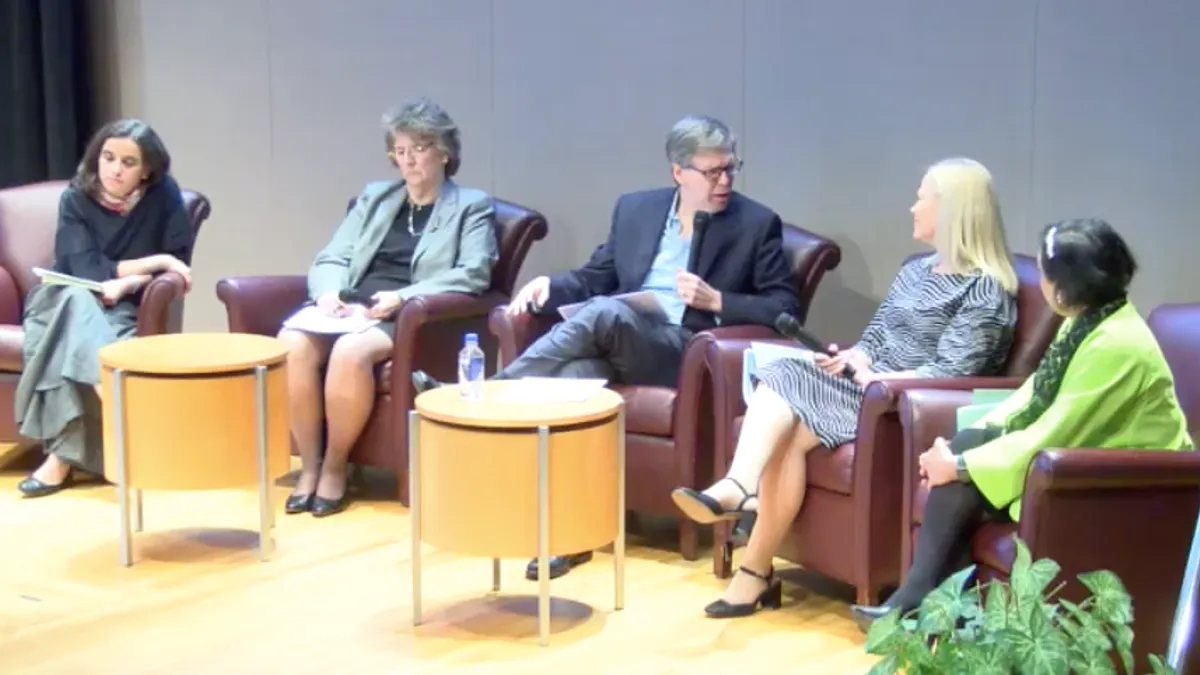The U.S. should stop striving for "one best strategy" for providing early-childhood education and care, and consider instead a diverse funding system for serving all children and families that honors America's "entrepreneurial, market-driven society," a leading early-childhood education researcher said Thursday.
"We've been too intellectually reliant on the public sector," Professor Sharon Lynn Kagan of Teachers College, Columbia University, said during the live-streamed release of the second of two "Early Advantage" books examining early education systems in other high-performing countries and what the U.S. can learn from them.
While the U.S. has a strong knowledge base about educating young children and public will to improve services, there is not yet a clear path toward addressing issues such as qualifications and compensation for early educators, and how data should be collected and used to improve programs and measure child outcomes, she said.
"Indeed, it is the social strategy that we haven't really figured out," Kagan said.
Part of an ongoing project of the National Center on Education and the Economy, the study included in-depth case studies of the early care and education systems in Australia, England, Finland, Hong Kong, Singapore and South Korea, aiming to identify lessons from those countries that can inspire change in the U.S. Kagan chose those for comparison based on their results as part of the Program for International Student Assessment, as well as how they rank on access to early education according to the Economist Intelligence Unit.
Kristiina Kumpulainen of Finland, who conducted the research on that country, described the small nation's "playful orientation" toward learning, the requirement that every child have an individualized education plan developed in partnership with parents, and the country's rigorous teacher preparation system where a four-year degree is even required to teach 1-year-olds. The nation also doesn't focus on achievement goals for students until they reach the age of 7.
Kathy Sylva, who led the research on England, described how the country's highly centralized system allows policies or programs to be implemented quickly. Among them is national curriculum for early-childhood education that is viewed as an "entitlement" for each English child. The country also has a strict program inspection system and provides free preschool beginning at age 3, and at age 2 for those from low-income families.
Hong Kong, inspired by the UK, also has a strict monitoring system, explained researcher Nirmala Rao. The government fully funds early education for 3- to 6-year-olds, but in recent years it replaced a parent voucher system with one in which the funding goes to schools. With influences from the UK, Hong Kong advocates play-based learning and the creativity of the child, but parents, she said, often emphasize the Chinese ideals of diligence, effort and proper behavior.
The speakers also highlighted shifting contexts and challenges in their own countries, including growing diversity and inequity, which has led some to move away from providing the same amount of funding for every child to implementing sliding scales or providing more funding and resources for those in poverty or with special needs. Sylva talked about a need to offer ongoing professional development to providers with basic levels of training, and Kumpulainen said Finland wants to recruit more diverse students into teacher preparation programs.
'The intersection between federal and state'
Experts responding to the findings discussed implications for the U.S. On finance, for example, Linda Smith, director of the Early Childhood Initiative at the Bipartisan Policy Center in Washington, said the U.S. is still working on how to pay for early-childhood education.
"I think we're stuck until we figure that out in this country," she said, adding that while advocates didn't want to get involved in the tax reform debate a couple of years ago, it's important to "look at the tools in this country" that are available.
She said it's also important to address which level of government should have authority over which services. "We've got to do a better job of understanding the intersection between federal and state," she said. "We have not really taken that on."
Others focused more on competencies for early education professionals — work that the National Association for the Education of Young Children has been leading through its "Power to the Profession" initiative. Rebecca Gomez, an education program officer with the Heising-Simons Foundation, noted that Americans tend to focus on what's "trending," but that it's important to focus on developing an entire system.
On requirements for teacher preparation, Gomez said she doesn't want to see teacher qualifications and compensation reforms result in a two-tiered system that contributes to continuing turnover among lower-paid teachers. A team approach, she said, can allow less-experienced assistants to learn from more highly trained educators.
"Diversity is our strength," she said. "But we need teachers that are prepared to work with all kinds of families and all kinds of children."








 Dive Awards
Dive Awards













